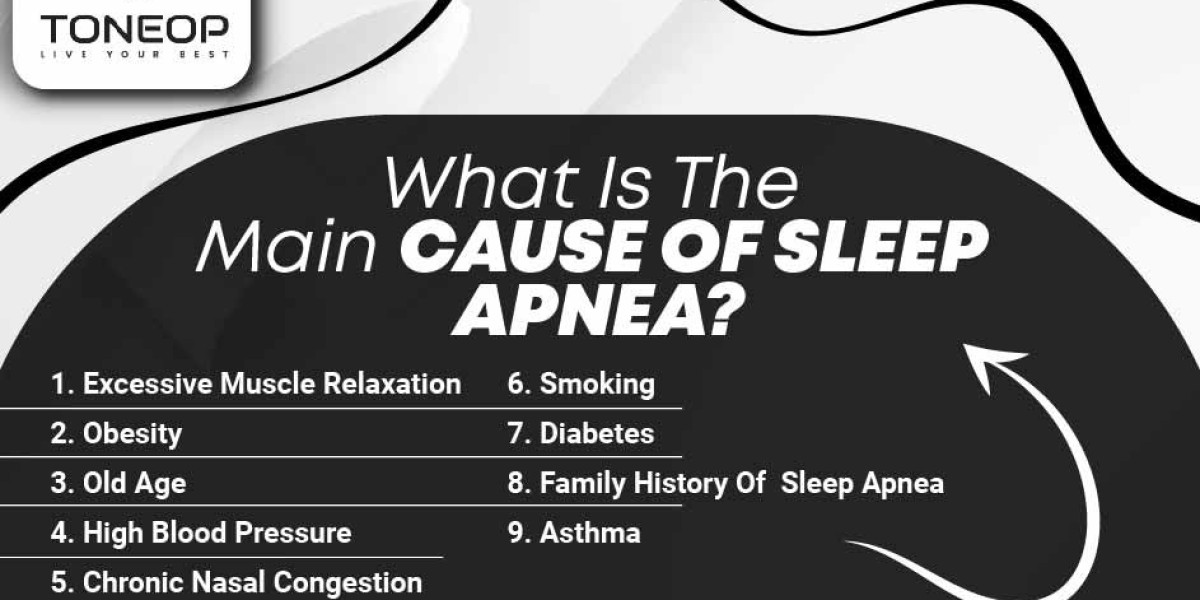These interruptions can lead to fragmented sleep, reduced oxygen levels, and increased strain on the heart, resulting in daytime fatigue, cognitive problems, and a heightened risk of conditions like hypertension, heart disease, and stroke. Recognizing the causes of OSA is essential for prevention and effective treatment. Let’s explore the key causes and treatment options for sleep-breathing disorders, including obstructive sleep apnea.
What Is Obstructive Sleep Apnea?
Obstructive Sleep Apnea (OSA) is a sleep disorder where repeated interruptions in breathing occur due to blocked airways. These blockages can reduce blood oxygen levels, prompting the brain to wake you briefly to resume breathing. This cycle can repeat throughout the night, leading to poor sleep quality.
Common symptoms of OSA include loud snoring, noticeable pauses in breathing during sleep, and excessive daytime tiredness. Untreated, OSA can result in mood changes, cognitive issues, and more serious health conditions like hypertension, heart disease, and stroke. If you suspect you have OSA, it’s essential to consult a doctor for proper diagnosis and treatment.
What Causes Breathing Problems During Sleep?
Breathing issues during sleep typically stem from upper airway obstruction, where the tongue and throat muscles block airflow. This can occur due to various factors, including obesity, smoking, or even genetic traits, and may result in conditions like sleep apnea.
Airway blockage leads to reduced respiratory drive, decreased muscle tone, and anatomical risks, such as a large neck circumference or excess tissue, which can cause the airway to collapse during sleep.
Major Causes of Sleep Apnea
1. Excessive Muscle Relaxation: OSA happens when throat muscles relax too much during sleep, causing the airway to narrow or close entirely.
2. Obesity: Excess fat around the upper airway increases the risk of airway collapse during sleep, worsening OSA.
3. Old Age: As we age, muscle tone decreases, making it more likely for the airway to collapse during sleep.
4. High Blood Pressure: Hypertension can damage blood vessels and inflame airway tissues, contributing to OSA.
5. Chronic Nasal Congestion: Allergies, sinus issues, or cold weather can block nasal passages, forcing mouth breathing and increasing the risk of airway collapse.
6. Smoking: Smoking inflames and narrows the upper airway, increasing the likelihood of OSA.
7. Diabetes: Neuropathy and insulin resistance linked to diabetes can contribute to airway collapse during sleep.
8. Family History: Genetic factors, such as a naturally narrow airway, can increase the likelihood of developing OSA.
9. Asthma: Chronic inflammation in asthma patients can narrow airways during sleep, leading to a higher risk of OSA.
Tips to Prevent Sleep Apnea
1. Maintain a Sleep Schedule: Stick to a regular sleep routine to improve sleep quality.
2. Use a CPAP Machine: Continuous Positive Airway Pressure (CPAP) therapy can help keep airways open during sleep.
3. Adjust Your Sleeping Position: Sleeping on your side can reduce apnea symptoms.
4. Choose the Right Pillow: The correct pillow can help maintain proper neck alignment, preventing airway obstruction.
5. Humidify Your Bedroom: Humidifiers can ease dry throat symptoms and improve CPAP therapy effectiveness.
6. Adopt Healthy Lifestyle Changes: Eat a balanced diet, exercise regularly, and manage your weight.
7. Avoid Alcohol Before Bed: Alcohol relaxes throat muscles, increasing the risk of airway obstruction.
8. Quit Smoking: Smoking causes inflammation and airway narrowing, increasing the likelihood of OSA.
Obstructive Sleep Apnea Treatment Options
There are various treatment options available, including:
- CPAP Therapy: Continuous air pressure helps keep airways open during sleep.
- Oral Appliances: Devices worn at night can prevent airway collapse.
- Surgery: In severe cases, surgery may be necessary to remove tissue blocking the airway.
The Final Say
Obstructive Sleep Apnea affects millions of people worldwide, disrupting sleep quality and increasing the risk of life-threatening complications. With proper treatment and lifestyle adjustments, you can manage this condition and improve your overall health.
FAQs
1. How long does obstructive sleep apnea last?
OSA is a chronic condition. While lifestyle changes and treatments may help manage it, OSA can be a lifelong issue for many people.
2. What happens if you have OSA?
Untreated OSA can lead to poor sleep quality, chronic fatigue, and serious health problems such as heart disease and stroke.
About ToneOp
ToneOp is a health platform offering customized diet, fitness, and yoga plans to help you lead a healthier lifestyle.
Visit our website:
https://toneop.com/blog/sleep-breathing-disorders










